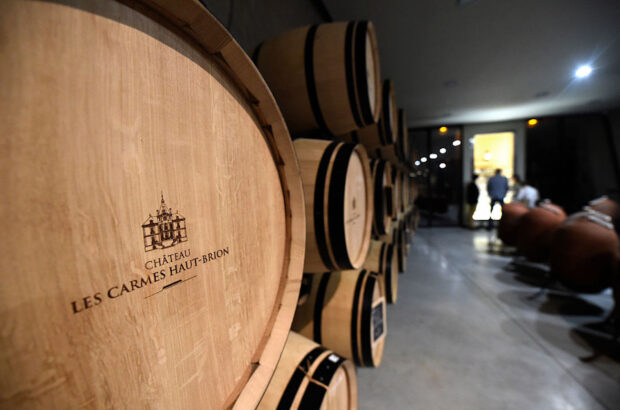For meat lovers, an evening with a succulent, juicy steak and a delicious bottle of wine is one of life’s great pleasures. The big meaty flavours of a steak demand an equally big wine with plenty of tannins – and the good news is there are several red grapes and wine styles that fit the bill.
As with any food pairing, it’s also useful to consider the other ingredients on your plate. Are you serving steak with chips or a salad? What sauce is on the side? Read on to discover go-to wine styles for steak, tips on pairing with particular cuts of meat and other things to consider if you’re preparing a special steak dinner…
Malbec and steak: a match made in heaven

Seasoning medium rare steak Credit: zoranm / E+ / Getty Images
There are several classic wine pairings for steak and top of the list is the Malbec grape. With their lush dark fruit and naturally high tannins, Malbec wines and blends are a safe choice if you’re unsure what to buy.
Two main regions should be on your radar. First is Argentina, the New World country that has become synonymous with quality Malbec at all price points. The region of Mendoza has more Malbec planted than anywhere else in the world. It’s home to 76% of Argentina’s vineyards and Malbec plantings here account for one-fifth of the total Malbec in the country. So look out for the name on wine labels.
Since Argentina is also famous for the production of high-quality beef, it’s no surprise that steak and Malbec have found a perfect partnership here. The classic style of Argentinian Malbec is an oaked wine packed with layers of dark fruit and spice. But it’s also worth considering fresher styles.
‘I tend to choose a “new wave” Malbec, one with less oak, fresher fruit and better acidity,’ says South American wine expert Patricio Tapia, editor of the annual Guida Descorchados. ‘Especially ones coming from places like Altamira and Gualtallary in the Uco Valley, towards the Andes Mountains.’ he added. ‘Always keep in mind that the main task for a glass of wine is to refresh the food.’
The other region to seek out for top Malbec is the grape’s French homeland of Cahors. Although this region in southwest France doesn’t produce as much Malbec as Argentina, it can be a good source of value bottles, with styles ranging from the traditional gutsy and full-bodied to light and fruity.
Cabernet Sauvignon: a classic choice

Sliced steak with rosemary and roasted garlic Credit: VICUSCHKA / Moment / Getty Images
Another great option if you’re looking to pour a full-bodied red wine, is Cabernet Sauvignon. A winning combination of dark fruits, tannin and naturally high acidity makes Cabernet and Cabernet-dominant blends a successful partner for steak.
The most classic of Cabernet regions is Bordeaux, whose red wines are also known as claret. More Cabernet Sauvignon is planted on the Left Bank, so these wines will be richer in style. Right Bank Bordeaux is Merlot-dominant so the wines will be more supple. But both varieties are planted throughout Bordeaux so claret is usually a blend of the two.
France isn’t the only source of Cabernet Sauvignon however. This adaptable grape is successfully grown all over the world from Australia and China to South Africa and California. ‘A powerful California Cabernet Sauvignonwith a grilled steak is pretty hard to beat,’ says US wine expert Karen MacNeil in her 10 rules to food and wine pairing.
Syrah to Pinotage: more red options

Credit: Instants / E+ / Getty Images
‘I’d urge people to look beyond the traditional matches of Malbec or Cabernet Sauvignon with steak,’ says wine writer and DWWA judge Peter Richards MW. ‘The risk with steak is to think big meaty flavours equals big wine,’ he adds.
‘How about a nice lively Cabernet Franc? Or may even a Carignan, Cinsault or cool-climate Syrah? Even a full-bodied but elegant rosé can work well on a warm day,’ says Richards.
With its spicy black pepper notes, Syrah – also known as Shiraz – is a particularly good match for the smoky flavours of steak cooked on a barbecue. Generous Australian Shiraz is a reliably good pairing. While classic examples from the Rhône Valley in France will often have a delicious savoury smoky bacon note too.
South Africa is also a source of great Syrah/Shiraz for steak – look out for examples from Swartland. While smoky South African Pinotage is another natural fit for flame-grilled steaks.
If you’re keen to experiment, there’s a long list of native grapes from countries around the world that would suit steak. Portugal’s gutsy Douro Valley reds are usually field blends of local varieties such as Touriga Nacional and Tinta Roriz. Or how about Sangiovese from Italy?
Four classic red grapes for steak
- Malbec
- Cabernet Sauvignon
- Syrah / Shiraz
- Pinotage
Does Pinot Noir go with steak?
Most Pinot Noir wines tend to sit at the light- to medium-bodied end of the flavour spectrum. So its profile is often therefore paired-up with lighter meats sand white meat. Yet Pinot Noir’s natural acidity and bright, red berry fruit can work with your steak dinner, depending on the style and the cut.
In general, think about trying Pinots with leaner cuts of beef, such as fillet, which are cooked rare to medium-rare. Steak tartare will go nicely with a Pinot Noir for example.
Ribeye or fillet steak?

Barbecue bone-in ribeye steak Credit: istetiana / Moment / Getty Images
‘The easiest way to pair wine with beef is to think about matching the flavour intensity of your wine with your beef,’ says Mark Quick, wine director for the Hawksmoor group of steakhouse restaurants, in this in-depth article about pairing wine with beef.
Consider the fat content in your meat, for example. ‘More fat equals more intense beefy flavour,’ says Quick.
Food-and-wine-pairing expert and Decanter contributing editor, Fiona Beckett agrees. She recommends pairing a ribeye steak with its relatively high fat content with a Syrah-based Côte-Rôtie from the Northern Rhône or a SuperTuscan Italian red – ‘both generous, ripe and full-bodied’.
Meanwhile she recommends riper, more fruit-driven styles of red for steak cooked well-done.
What sauce?

Béarnaise sauce Credit: svariophoto / iStock / Getty Images Plus
Serving a sauce with any meat will influence the wine pairing. Common choices for steak include béarnaise, peppercorn sauce, spicy South American chimichurri, mushroom sauce or mustard.
‘Sauces and sides will also be just as important when it comes to the choice of wine,’says Richards. ‘Creamy sauces like béarnaise can go well with an oakier wine. Syrah can work well with peppercorns.’
‘For peppercorn sauce, as it’s so rich I would suggest a plummy and fruity Malbec, a Bordeaux, a reserva Rioja or a nice medium- to full-bodied Douro red,’ adds Alberto Almeida, head sommelier at Lainston House. ‘With béarnaise, maybe something with a bit more acidity and tannin, such as a Brunello di Montalcino made with the Sangiovese grape.’
Lorenzo Tili, head sommelier at The Goring agrees. ‘Bérnaise sauce requires a red wine with pronounced flavour intensity, full body, good tannins and enough acidity to cut through the sweet meat and creaminess given from the sauce. Sangiovese will always deliver very well. He suggests Vino Nobile di Montepulciano Riserva and Chianti Classico Gran Selezione from Tuscany, or Torgiano Rosso Riserva from Umbria.
‘With spicy sauces like chimichurri, we want to pair a smooth red with round tannins. But pay attention at the abv,’ warns Tili. ‘If the alcohol is too high, it will increase the spicy sensation of the food on the palate – in particular with red hot chilli – and the result won’t be pleasant!’
White wine with steak?
If you aren’t a fan of red wines, can you pair steak with white wines or rosés? The answer is yes, as long as you go for fuller-bodied examples. Think oaked Chardonnay or Cerasuolo d’Abruzzo, a characterful Italian rosé made from Montepulciano, with cherry and savoury flavours.
Discovery is, after all, one of the most exciting things about the wine world. Experienced sommelier Matthieu Longuère MS, wine development manager at Le Cordon Bleu London, suggests mature white Rioja in his article about pairing white wine with red meat.
‘To pair with steak, I would go for a deep rosé, made with Malbec, Shiraz or Merlot grapes,’ says Almeida. ‘The dark colour shows more contact with the skins, so we’ll have a more robust and tannic wine to help the protein of the steak.’
‘Look for a wine characterised by full body and good structure,’ agrees Tili. ‘A blend from the Southern Rhône appellation of Tavel (mainly Grenache and Cinsault with other local varieties) would certainly be one of the best options. Alternatively a rosé made from Aglianico and Sagrantino grapes, which are very rich in polyphenols, from Central and Southern Italy would also perform very well.’
If you’re still undecided on which wine to choose, here are some recommendations from the Decanter team, to suit every pocket and occasion – from special celebrations to budget mid-week suppers…







